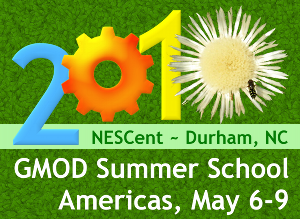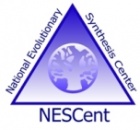GMOD
2010 GMOD Summer School - Americas

|
2010 GMOD
Summer School - Americas 6-9 May, 2010 NESCent Durham, NC, USA |

The 2010 GMOD Summer School - Americas was held 6-9 May at the National Evolutionary Synthesis Center (NESCent) in Durham, North Carolina. Like previous GMOD Summer Schools, this course focused on installing, configuring and integrating popular GMOD Components. Sessions were taught by GMOD Component developers and GMOD staff. There was space in the course for 25 participants, and admission was competitive.
All of the sessions from this school have now been moved to this website, where they are available as Online Tutorials.
Contents
- 1 Applications
- 2 Program
- 3 Instructors
- 4 Prerequisites
- 5 System Requirements
- 6 Costs
- 7 Sponsor
- 8 Travel, Lodging and Food
- 9 Feedback
Applications
The deadline for applying to the summer school has now passed.
Program
The program featured 4 full days of hands-on training starting with an overview of GMOD, and then covering the installation, configuration, and administration of several popular GMOD Components.
| Time | Session |
|---|---|
| Thursday May 6 | |
| 8:45am | Introduction
and Overview Scott Cain and Dave Clements Participant and instructor introductions, how the GMOD project works, what software tools are available in GMOD, how they interoperate, what resources are needed to get a GMOD installation up and running, and course overview |
| 10:25am | VMware and BioPerl Setup Everyone Get the GMOD Summer School VMware image up and running on your laptop, and then finish installation of BioPerl. |
| 12:15pm | Lunch on your own |
| 1:15pm | MAKER
I Carson Holt MAKER overview, installation, basic configuration for annotating genomic sequence, re-annotation options, and improving annotation quality |
| 4:30pm | Social
Hour w/ NESCent Staff and then Dinner on your own |
| 6:30pm | MAKER
II Carson Holt Advanced MAKER configuration, re-annotation options, and improving annotation quality |
| 7:30pm | Open
Discussion and User Presentations Everyone This session is open to any and all questions you have on the GMOD Project, GMOD Components, and GMOD users. The instructors will come with their knowledge of GMOD and their opinions on the project's strengths, weaknesses, and future directions. Students will also have the opportunity to share work from their projects with the rest of the group. We expect this session to be lively. |
| 8:30pm | Day ends |
| Friday May 7 | |
| 8:45am | GBrowse Scott Cain |
| 1:00pm | Lunch on your own |
| 2:00pm | Galaxy James Taylor Introduction; Installation and configuration of Galaxy; Defining your own tools; ... |
| 6:00pm | JBrowse Mitch Skinner JBrowse installation, configuration and administration; converting GFF3 to JSON and loading it into JBrowse. |
| 8:00pm | Day ends |
| Saturday May 8 | |
| 8:45am | Chado
I Scott Cain and Dave Clements |
| 1:00pm | Lunch on your own |
| 2:00pm | Chado
II Scott Cain and Dave Clements |
| 3:00pm | Apollo Ed Lee Overview, basic installation, basic configuration, reading/writing data, and remote analyses. Custom installation (building Apollo from source), advanced configuration, and setting up customized Java Web Start instance. |
| 7:30pm | Day ends |
| Sunday May 9 | |
| 8:45am | GBrowse_syn Sheldon McKay |
| 12:30pm | Lunch on your own |
| 1:30pm | Tripal Stephen Ficklin Tripal is a web front end to Chado databases built on Drupal. This class will introduce Drupal and Tripal architecture, and then cover Tripal installation, configuration and administration. |
| 6:00pm | Wrapup
and Resources Dave Clements and Scott Cain |
| 6:30pm | Summer School Ends |
Instructors
| Instructor | GMOD Affiliation | Affiliation |
|---|---|---|
| Scott Cain | GMOD Project Coordinator; Chado, GBrowse | <a href=”http://www.oicr.on.ca/” class=”external text” |
| rel=”nofollow”>Ontario Institute for Cancer Research</a> | ||
| Dave Clements | GMOD Help Desk | <a href=”http://nescent.org/” class=”external text” |
| rel=”nofollow”>National Evolutionary Synthesis Center (NESCent)</a> | ||
| Stephen Ficklin | Tripal | <a href=”http://www.genome.clemson.edu/” class=”external text” |
| rel=”nofollow”>Clemson University Genomics Institute</a> | ||
| Carson Holt | MAKER | <a href=”http://www.utah.edu” class=”external text” |
| rel=”nofollow”>University of Utah</a> | ||
| Ed Lee | Apollo | <a href=”http://www.berkeleybop.org/” class=”external text” |
| rel=”nofollow”>Berkeley Bioinformatics Open-source Projects (BBOP)</a> | ||
| Sheldon McKay | GBrowse_syn, GBrowse | Cold |
| Spring Harbor Laboratory</a> | ||
| Mitch Skinner | JBrowse | <a href=”http://berkeley.edu” class=”external text” |
| rel=”nofollow”>University of California, Berkeley</a> | ||
| James Taylor | Galaxy | <a href=”http://www.emory.edu” class=”external text” |
| rel=”nofollow”>Emory University</a> |
Prerequisites
The course requires a minimal level of Linux systems administration knowledge (see Computing Requirements). By “a minimal level of Linux systems administration knowledge” we mean that participants should be
- Comfortable with the Linux command line interface, and
- Comfortable installing packages under Linux.
A good benchmark for this level of knowledge is that you should be able to get a basic GBrowse installation (that is, GBrowse without MySQL) up and running with the example GBrowse data. This also requires installing Apache, and BioPerl and all its dependencies.
System Requirements
Participants are required to bring their own laptops, already capable of running a VMware system image.
The course starts with getting a VMware image (built specifically for the course) up and running on your machine. We then build upon that image in each succeeding session.
VMware on Windows and Linux
![]()
A free VMware player is available for Microsoft Windows and Linux operating systems from VMware. You will need to register to download it. There are multiple versions. Be sure to download a version that can run on your laptop.
VMware on Mac OS X
Participants can also bring newer Macs with Intel processors. The Intel processor is a requirement for all the packages discussed below. There is no free VMware player that runs directly under Mac OS X. However, there are several other options, all of which require an Intel Mac:
VMware Fusion
VMware Fusion ($80/corporate, $40/Academic) allows you to run VMware images (as well as Windows and Linux) under Mac OS. We recommend this option for Mac users. There is a fully functional, 30 day free trial version of VMware Fusion available for download.
![]()
VirtualBox
VirtualBox is free and open source, and runs on Intel Macs (and Windows, Linux and Solaris too). It claims to be capable of running VMware images, but we have not tested this with our images.
Costs
This course is free thanks to
- NIH grant 1R01HG004483-01 under Ian Holmes
- Financial support from NESCent
- The grants of the individual instructors
Sponsor
We would like to thank the National Evolutionary Synthesis Center (NESCent) for hosting and financially supporting this course. Travel awards are entirely funded by NESCent, as part of its Education and Outreach effort. NESCent’s Education and Outreach Group is committed to sharing the exciting evolutionary biology research occurring at NESCent and elsewhere. In addition, NESCent is interested in outreach to groups who are underrepresented in evolutionary biology and improving evolution education, and offers resources for scientists, educators, and the general public that meet these goals.
Travel, Lodging and Food
The course was held at the National Evolutionary Synthesis Center (NESCent) in Durham, North Carolina, United States. The closest airport is Raleigh-Durham International Airport (RDU), a 30 minute drive from NESCent.
Participants are responsible for their own travel, lodging and some meal costs.
Feedback
22 of 25 participants filled out the post-course feedback form.
| Would you recommend GMOD Summer School to others? | Please rate the quality of the course overall. | |||||||||||||||||||||||||||||||
|
|
|||||||||||||||||||||||||||||||
Comments on the 2010 GMOD Summer School - Americas
| “I would whole-heartedly recommend this course to others! It was extremely informative.” “Overall it was exceptional.” “Great job!” “Overall this course was essential for me to be able to go forward and implement the GMOD tools.” “Instructors and participants were all bright, articulate, and interesting. The days were long but the pace was reasonable. Overall, this was one of the best ongoing education experiences I have ever had.” “The speakers were really good.” | “It was an amazing course.” “The amount of information presented was terrific and the online course material was very well done. I learned a lot!” “It was definitely a very informative course.” “This class held me riveted for 4 days straight.” “Really good organization and atmosphere. I loved the use of the wiki and the idea of building up a community. You are doing a great job!” “Having the wiki ROCKS.” |
